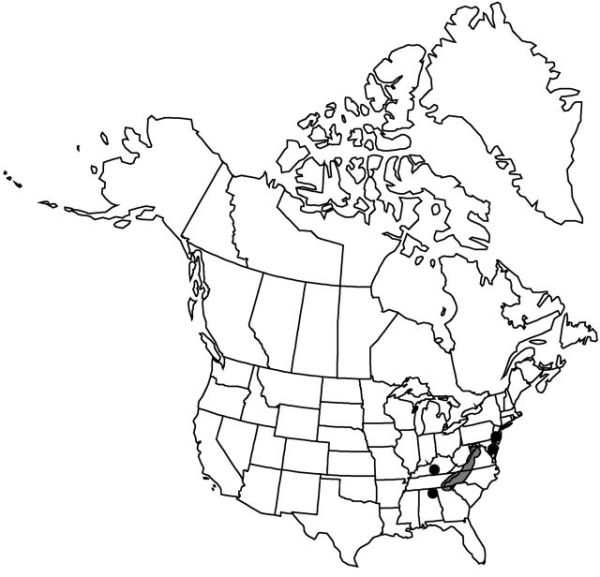Difference between revisions of "Xerophyllum asphodeloides"
Gen. N. Amer. Pl. 1: 235. 1818.
Common names: Turkey-beard mountain-asphodel
Endemic
Basionym: Helonias asphodeloides Linnaeus Sp. Pl. ed. 2, 1: 485. 1762
FNA>Volume Importer |
imported>Volume Importer |
||
| (6 intermediate revisions by 2 users not shown) | |||
| Line 8: | Line 8: | ||
}} | }} | ||
|common_names=Turkey-beard;mountain-asphodel | |common_names=Turkey-beard;mountain-asphodel | ||
| − | |basionyms={{Treatment/ID/ | + | |special_status={{Treatment/ID/Special_status |
| + | |code=E | ||
| + | |label=Endemic | ||
| + | }} | ||
| + | |basionyms={{Treatment/ID/Basionym | ||
|name=Helonias asphodeloides | |name=Helonias asphodeloides | ||
|authority=Linnaeus | |authority=Linnaeus | ||
| + | |rank=species | ||
| + | |publication_title=Sp. Pl. ed. | ||
| + | |publication_place=2, 1: 485. 1762 | ||
}} | }} | ||
|synonyms= | |synonyms= | ||
| Line 27: | Line 34: | ||
|elevation=0–1400 m | |elevation=0–1400 m | ||
|distribution=Ala.;Del.;Ga.;Ky.;Md.;N.J.;N.C.;S.C.;Tenn.;Va.;W.Va. | |distribution=Ala.;Del.;Ga.;Ky.;Md.;N.J.;N.C.;S.C.;Tenn.;Va.;W.Va. | ||
| − | |discussion=<p>Xerophyllum asphodeloides is disjunct from the xeric oak-hickory forests of the southern Blue Ridge Mountains to the dry sandy soils of the pine barrens of New Jersey (L. Artz 1951; W. B. Zomlefer 1997b). Xerophia, a unique alkaloid, has been reported from this species (W. Procter 1839).</p> | + | |discussion=<p><i>Xerophyllum asphodeloides</i> is disjunct from the xeric oak-hickory forests of the southern Blue Ridge Mountains to the dry sandy soils of the pine barrens of New Jersey (L. Artz 1951; W. B. Zomlefer 1997b). Xerophia, a unique alkaloid, has been reported from this species (W. Procter 1839).</p> |
|tables= | |tables= | ||
|references= | |references= | ||
| Line 36: | Line 43: | ||
-->{{#Taxon: | -->{{#Taxon: | ||
name=Xerophyllum asphodeloides | name=Xerophyllum asphodeloides | ||
| − | |||
|authority=(Linnaeus) Nuttall | |authority=(Linnaeus) Nuttall | ||
|rank=species | |rank=species | ||
| Line 50: | Line 56: | ||
|publication title=Gen. N. Amer. Pl. | |publication title=Gen. N. Amer. Pl. | ||
|publication year=1818 | |publication year=1818 | ||
| − | |special status= | + | |special status=Endemic |
| − | |source xml=https:// | + | |source xml=https://bitbucket.org/aafc-mbb/fna-data-curation/src/2e0870ddd59836b60bcf96646a41e87ea5a5943a/coarse_grained_fna_xml/V26/V26_52.xml |
|genus=Xerophyllum | |genus=Xerophyllum | ||
|species=Xerophyllum asphodeloides | |species=Xerophyllum asphodeloides | ||
Latest revision as of 21:15, 5 November 2020
Stems (0.5–)0.8–1(–1.5) m. Leaf blade 3–5 dm × 1–2.5 mm. Racemes 1.5–3 dm. Tepals oblong to ovate, 5–8 × 2–3 mm; styles 1.5–2 mm. Capsules 4–5.5 mm. Seeds 2 per locule. 2n = 30.
Phenology: Flowering spring–early summer.
Habitat: Pine barrens and dry mountain woods
Elevation: 0–1400 m
Distribution

Ala., Del., Ga., Ky., Md., N.J., N.C., S.C., Tenn., Va., W.Va.
Discussion
Xerophyllum asphodeloides is disjunct from the xeric oak-hickory forests of the southern Blue Ridge Mountains to the dry sandy soils of the pine barrens of New Jersey (L. Artz 1951; W. B. Zomlefer 1997b). Xerophia, a unique alkaloid, has been reported from this species (W. Procter 1839).
Selected References
None.
Lower Taxa
None.